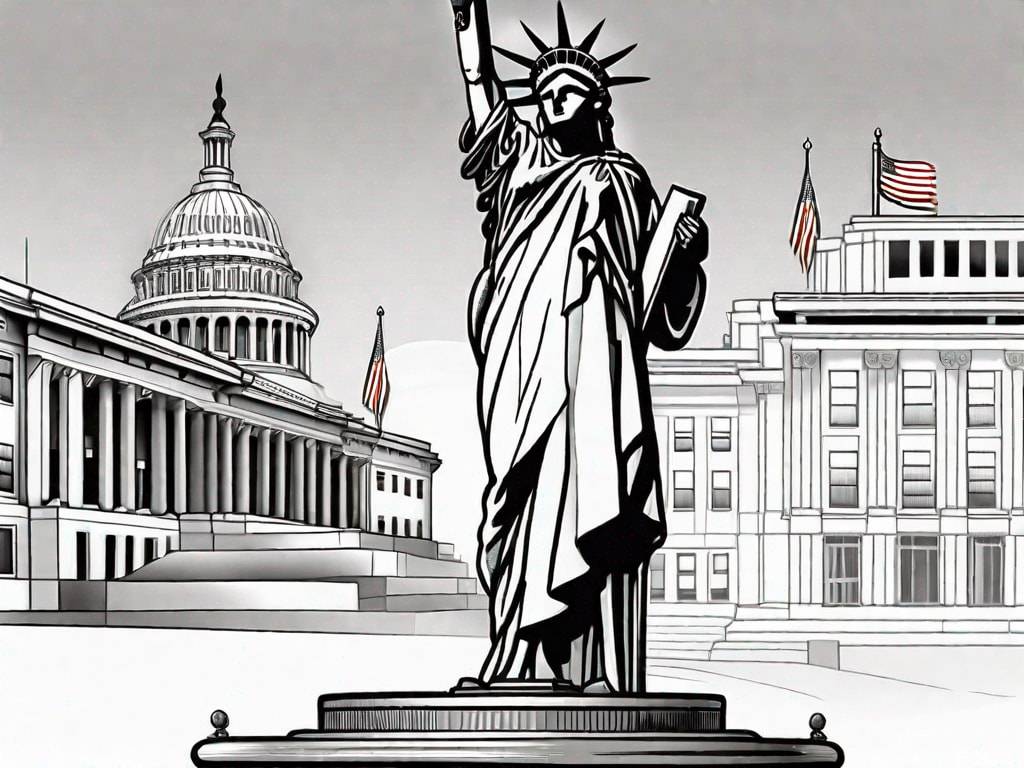What does Democracy Really Mean in America for Liberty, Justice and Politics?
All People are Created Equal

Democracy. It is a word that holds immense power and significance, not just in America, but across the globe. It is a concept that represents the collective aspirations of the people, their desire for liberty, justice, and a political system that works for the greater good. Embark on an exhilarating expedition with me as we explore the very essence of democracy in America. Together, we shall plunge into the depths of its influence on liberty, justice, and the political landscape. Brace yourself for a captivating voyage as we unravel the complex tapestry of democracy, unearthing its profound implications on our vibrant society. I have a copy of the US Constitution and the Declaration of Independence from many years ago as part of a research project.
Understanding the Concept of Democracy
Before we dive into the intricacies of democracy in America, let us first grasp its essence. Democracy, at its core, is a system of government in which power lies in the hands of the people. It is a beacon of hope, an embodiment of the belief that every individual's voice matters, and their participation in decision-making is not just encouraged but cherished. The concept of democracy has evolved over centuries, adapting to the ever-changing needs of societies.
In order to truly understand the concept of democracy, it is important to explore its origin and evolution. By delving into the historical roots of this remarkable system of governance, we can gain a deeper appreciation for its significance in our modern world.
The Origin and Evolution of Democracy
In ancient Greece, the cradle of democracy, citizens were actively involved in the political process. They would gather in open forums to debate and make decisions concerning the welfare of their city-state. This direct form of democracy, known as "Athenian democracy," was a remarkable experiment in governance that laid the foundation for the democracies we see today.
As time passed, democracy spread its wings, finding its way into various forms of government across different nations. Each society added its own unique flavor to the concept, weaving a rich tapestry of democratic ideals. From the parliamentary system in the United Kingdom to the presidential system in the United States, democracy has taken on diverse forms, adapting to the cultural, social, and political contexts of each nation.
Throughout history, democracy has faced numerous challenges and obstacles. It has weathered storms of oppression, fought against tyranny, and emerged stronger than ever. The struggles and triumphs of those who fought for democratic values serve as a testament to the resilience and enduring power of this system of government.
Key Principles of Democracy
At the heart of democracy lie several key principles that shape its functioning. These principles not only guide the actions of governments but also serve as a compass for individuals seeking justice and equality.
One of the fundamental principles of democracy is the protection of individual rights.
In a democratic society, every person is entitled to certain inalienable rights, such as freedom of speech, freedom of religion, and the right to a fair trial. These rights are not granted by the government but are inherent to every human being, and it is the duty of the government to protect and uphold them.
Another crucial principle is the rule of law. In a democratic society, no one is above the law, not even those in positions of power. The law acts as a safeguard, ensuring that all individuals are treated fairly and justly. It provides a framework within which disputes can be resolved and justice can be served.
Free and fair elections are also a cornerstone of democracy. They provide an opportunity for the people to choose their representatives and have a say in the decision-making process. Elections serve as a mechanism for accountability, allowing citizens to hold their leaders responsible for their actions and decisions.
The separation of powers is yet another key principle of democracy. It ensures that power is not concentrated in the hands of a single individual or institution. Instead, power is divided among different branches of government, such as the executive, legislative, and judicial branches. This system of checks and balances prevents any one entity from becoming too powerful and helps maintain the integrity of the democratic process.
As we explore the concept of democracy, it becomes evident that it is not just a political system but a way of life. It is a constant pursuit of justice, equality, and freedom. Democracy empowers individuals, giving them a voice and the ability to shape their own destinies. It is a beacon of hope in a world that often grapples with injustice and inequality.
Democracy and Liberty in America
One cannot discuss democracy in America without recognizing its profound impact on liberty. Democracy empowers individuals, giving them the freedom to express their opinions, advocate for their rights, and participate actively in shaping the destiny of their nation.
The Role of Democracy in Safeguarding Liberty
In a democratic society, liberty thrives. It is nurtured by a system that upholds the principles of free speech, press freedom, and the right to assembly. The power of democracy lies in its ability to safeguard these fundamental rights, allowing individuals to live in a society where their voices are heard, their freedoms protected, and their aspirations respected.
Challenges to Liberty in a Democratic Society
However, liberty in a democratic society is not without its challenges. While democracy inherently values individual freedom, it must also grapple with the complex task of balancing competing interests and ensuring the protection of all citizens. Striking this delicate balance is essential to prevent the tyranny of the majority and safeguard the liberties of marginalized communities.
Democracy's Impact on Justice
Justice and democracy are intertwined, for the principles of democracy strive to create a just society – a society where every individual is treated fairly, and their rights, regardless of their background, are upheld.
Democracy's Role in Promoting Justice
Democracy serves as a catalyst for justice, providing a platform for marginalized voices to be heard and their grievances addressed. In a democratic society, the rule of law prevails, ensuring that justice is not a privilege reserved for a few but a fundamental right accessible to all. It is through the democratic process that societies can rectify past injustices and build a more equitable future.
Potential Pitfalls of Democracy for Justice
However, we must also acknowledge the potential pitfalls that democracy can present when it comes to justice. The wheels of justice can be hindered by populism or narrow political interests, preventing marginalized communities from receiving the justice they deserve. It is crucial to constantly evaluate and refine the democratic system to ensure that justice remains a cornerstone of society.
The Intersection of Democracy and Politics
Politics and democracy go hand in hand, shaping the destiny of nations and forging the path towards a better future. The political system of a democratic society should be a reflection of the collective will of its citizens.
Democracy as a Political System
Democracy serves as the bedrock of the political system, creating a framework where individuals can actively engage in the political process. Through free and fair elections, citizens have the power to choose their representatives, ensuring that their voices are heard in the halls of power.
How Politics Shapes Democracy in America
The relationship between politics and democracy in America is intricate and symbiotic. Political campaigns, debates, and the clash of ideas are essential components of a thriving democratic society. While politics can be messy and contentious at times, it is through this process that ideas are refined, policies are debated, and progress is made.
The Future of Democracy in America
We find ourselves at a pivotal moment in history, where the future of democracy in America hangs in the balance. As our society evolves, so must our democracy, adapting to the challenges and opportunities of the modern age.
Emerging Trends in American Democracy
Technological advancements, global interconnectedness, and changing demographics are reshaping the landscape of American democracy. New trends and perspectives emerge, challenging us to question existing structures and strive for a democracy that truly represents the diverse voices of our nation.
Democracy's Potential Path Forward
As we contemplate the future, let us not lose sight of the core principles that have guided us thus far. Democracy, when nurtured and protected, holds immense potential to create a society built on liberty, justice, and sound governance. It is up to each of us to actively engage in the democratic process, to champion the values that we hold dear, and to ensure that democracy remains a beacon of hope for generations to come.
Democracy in America is not merely a political system; it is an aspiration and a way of life. It is the pursuit of a society where liberty reigns, justice prevails, and politics serves the common good. Let us cherish and safeguard the democratic ideals that have shaped our nation, and collectively work towards a future where democracy truly reflects the hopes and dreams of all Americans. The forces of division that proclaim an entitled racial right to govern based on prejudice and intolerance for people and culture different from their own. Let us remember to bring our tired, our poor, our better nature and unbiased wisdom.
Throughout history, democracy has been a source of inspiration for individuals around the world. Let us continue to be inspired by its power and strive to build a better tomorrow – a tomorrow where democracy flourishes, liberty is cherished, justice prevails, and politics is a force for positive change. After all, democracy is not just a word but a catalyst for a more inclusive and equitable world.
About the Creator
Wayne Ince
A military veteran that loves to read and write stories and poetry about mental health, love, and horror, and diversity topics. Boring on the surface, but I hope you enjoy my work and discover something more underneath the surface.





Comments
There are no comments for this story
Be the first to respond and start the conversation.